Josh: When I was growing up, the best way to judge if I really liked a new movie in theaters was if I wanted to see it more than once. My parents were not so patient as to let me drag them to the theaters to see The Mighty Ducks or Aladdin or The Sandlot multiple times—that was what my aunt was for. She was so happy to spend time with me that I could induce her to take me to the local General Cinema—remember General Cinema? I remember General Cinema—to see whatever movie I’d fallen in love with that week or month.
Now, I’m an adult with a 2-year-old son who’s not yet able to sit still to watch a feature-length film in theaters, though my wife and I have certainly tried. He lasted through an hour of Inside Out and only about 25 minutes of Finding Dory. However, we do let him watch appropriate movies and TV at home via our Apple TV if he’s in the mood. I tell a lie—I say “movies,” when I should really say “movie.” There’s only one movie our son wants to watch, morning, noon, or night. I wouldn’t have guessed when I saw the film by myself earlier this year how obsessed he would become with Zootopia. I enjoyed the film a great deal and walked out thinking that my wife would at least enjoy it. When the film was released on home video, I felt like rewatching in part to see if I would still dig the film as much as I did earlier in the year.
Since then, I’ve probably seen Zootopia, in part or in full, 50 times. This may be an understatement. Our son first saw it on a vacation in early June, and watched it again three more times before the week was over. Oliver’s at the age where he wants to watch the same thing, or same group of things, over and over and over and over again. I know he’ll grow out of it one day—at least he’ll age out of watching shows on Disney Junior. Zootopia is meant to be enjoyed by a wide range of audience members: toddler, adult, or somewhere in between. So I hope Oliver, as much as he enjoys what he calls “bunny movie” now, will move past it to something else in the months and years to come. But Tom, I know your daughter is older than my son—am I being laughably hopeful to presume that he might move onto something, anything else?
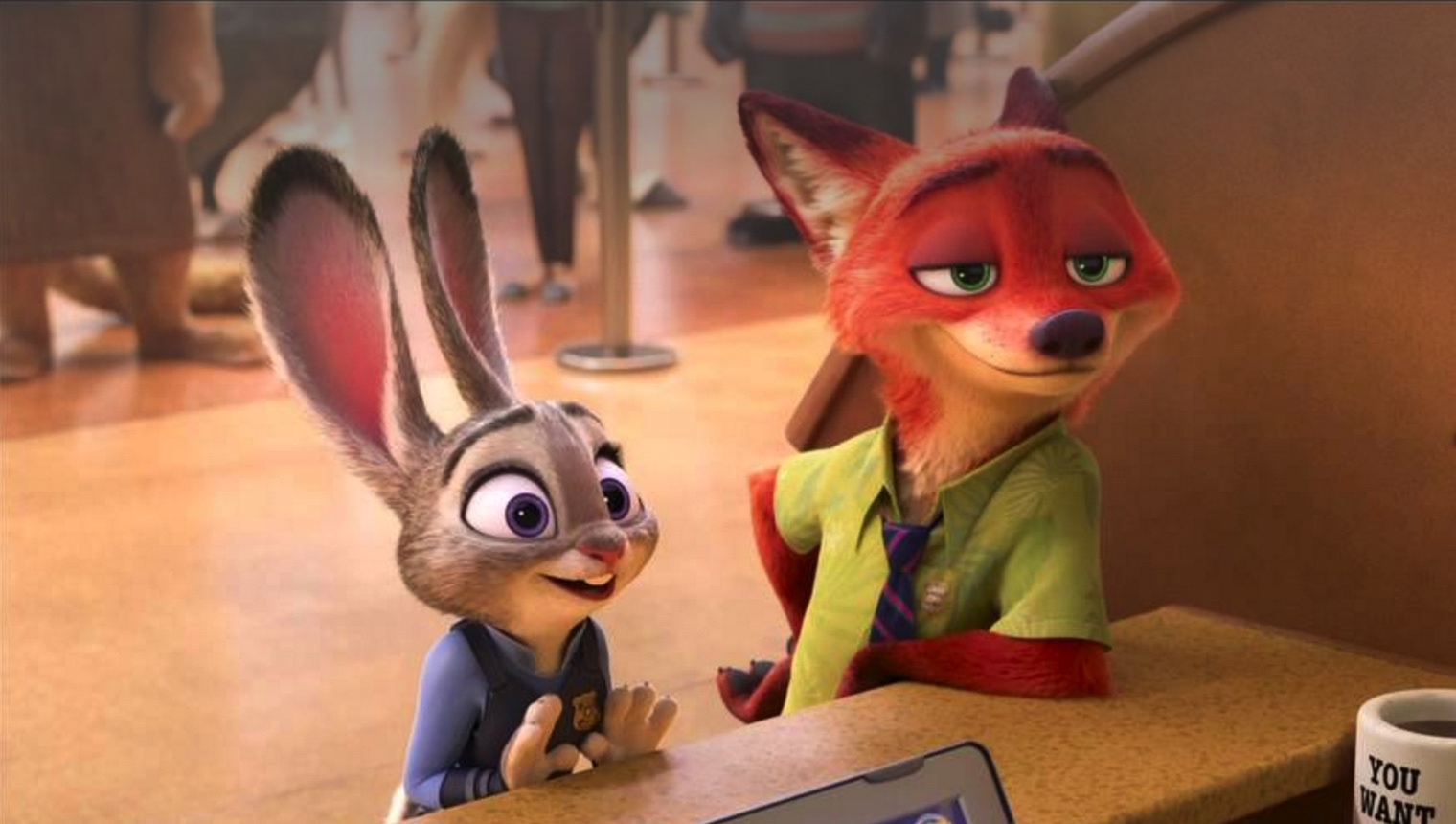
Tom: The good news, Josh, is that he will move onto something else. The bad news is that he’ll be just as obsessed with the next thing as he is with the current one.
My daughter is about a year older than your son, and is now able to (more or less) sit through a 70-minute animated feature. Over the summer, we cycled through a number of Disney movies that she decided, for a couple of weeks at a time each, was the only movie, and would watch it as obsessively as your son watches Zootopia. There was The Many Adventures of Winnie the Pooh for a long while, followed by an intense, months-long binge watch of Cinderella, then Tangled, and in the last week, suddenly it has become The Little Mermaid.
There’s a couple of reactions I have to all this. First, yeah, my daughter probably watches too much television, so if you’d like to complain, you can write to badparent@howdareyou.com. Second, I’ve come to understand a vital part of the modern parenting experience is a constant, unyielding exposure to a cultural universe that is not your own, but which you must learn to either enjoy or endure. (I’m sure we could easily write this same column about books or songs as well.)
My third reaction to all this binge-watching, though, is one that probably would not be universally shared (except perhaps among readers of this site): my surprise at the ways I ended up thinking about these movies critically. After about the 20th time I saw Cinderella this summer, I realized that my inclination to view movies through a critical lens was warping not just the way I saw that movie, but all movies. In particular, I’ve become obsessed with very little moments, trying to think about how and why those moments work (or don’t) and what they say about the rest of the picture.
Of course, this is pretty common practice across various forms of criticism, from academia down to the lowliest tweet. We like to use a single shot, or music cue, or gesture as a synecdoche for the whole movie and talk about what this small thing means to the big picture. Young Charlie Kane sledding in the background as his mother signs away custody of him, for example, is Citizen Kane in a nutshell, and you could write a whole essay about how Thatcher gave Kane his life while stealing his happiness based on that shot. Even if you’re not going to lean on an image quite so heavily, it’s likely there’s some moment in a movie that you feel sums it up. How many reviews have you read (or written) that open or close with a description of just such a moment? We do it because it works, because it’s a powerful way of thinking about art.
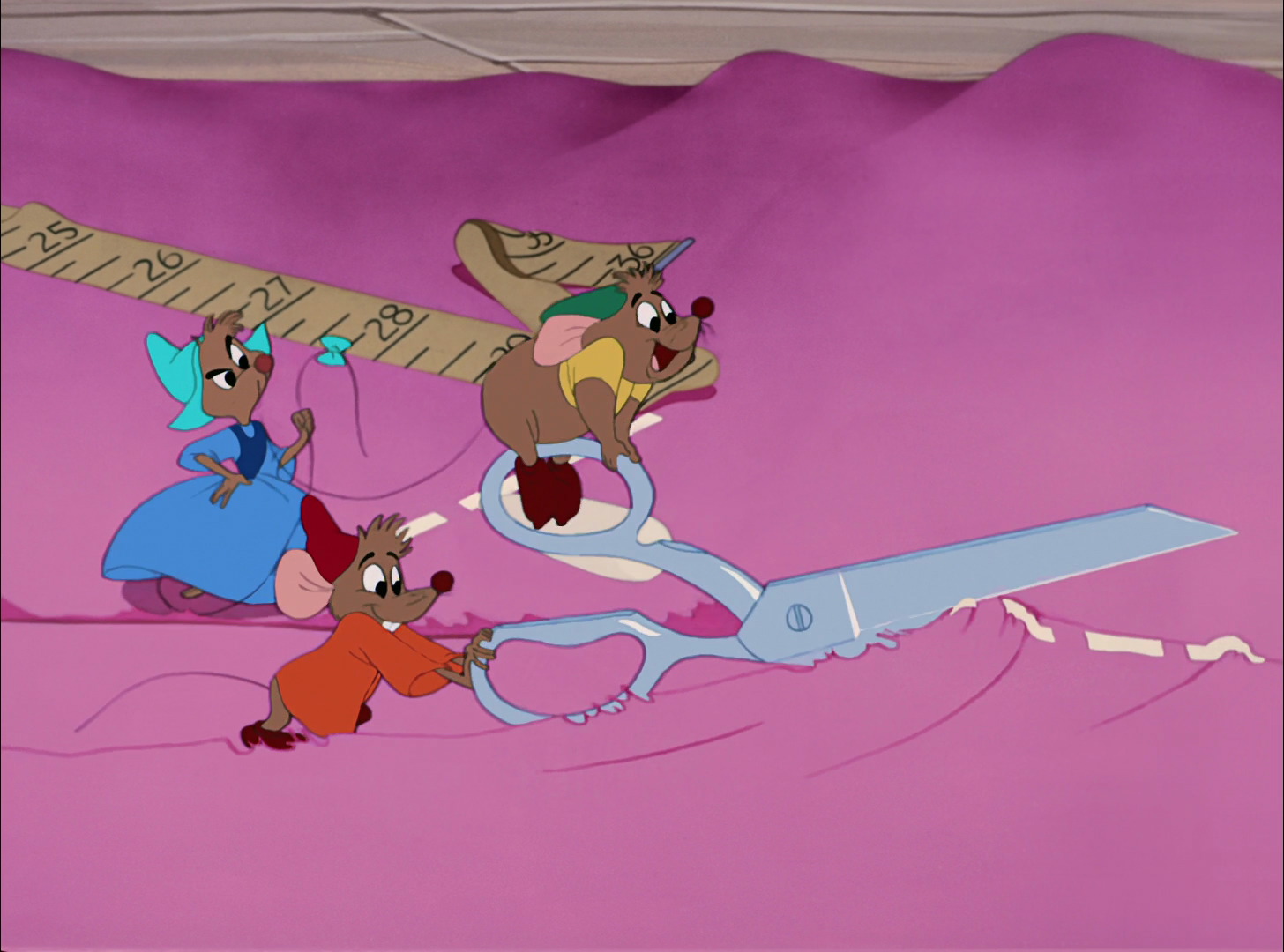
Yet I realized this could be perilous when I eagerly began anticipating a very small gag halfway through “The Work Song” in Cinderella. A refresher for those who haven’t spent numerous hours recently with this film: after the king summons all his subjects to attend a ball in the prince’s honor, Cinderella is told by her conniving stepmother that she can only go to the ball if she finishes all of her chores. Of course, the chores pile up and Cinderella is unable to find time to make her a dress, so her talking animal friends take it upon themselves to do it for her. The two lead mice, Jaq and Gus-Gus, join together to work a pair of scissors across a length of fabric. A girl mouse is drawing a line down this same fabric, and nearly gets her tail cut off as the two blithely bounce along, oblivious to the harm they’ve nearly caused.
The whole business lasts less than 4 seconds, and is just one of numerous gags featuring the two mice in the song. But the shot – how it interrupts the song ever so briefly, how the girl mouse nearly loses her tail, how Gus-Gus naively chants “duh duh duh” as he bounces – became a moment, if I was folding laundry or checking Twitter or otherwise not paying attention, that I had to witness. It was a compulsion. After a while, I naturally started to wonder why. What does it say about this movie, a movie about miracles and wishes coming true and the importance of honest friends? Is it perhaps that the innocent fun of Jaq and Gus-Gus, always pushing forward regardless of what’s ahead, is emblematic of the chances Disney Animation would be taking less and less of after Cinderella’s release? That even though you won’t get into as much trouble (no chance of tails being lost), the more risk-averse approach to moviemaking that Cinderella itself heralded in the Disney canon can be seen starting just moments later when this hand-made and slightly shabby dress is torn apart by Cinderella’s jealous stepsisters? That the whole movie is a metaphor for the history of American animation? Indeed, the whole history of post-war America, as capitalism slowly sucked away any chance for a better life except by an unexplained miracle we assume must come because of movies like Cinderella themselves?
Ah. Sorry. See what happened there? That’s the kind of madness that comes from spending too much time thinking about the same beats in a movie over and over again. Am I just an overly tired parent, or is there some truth to the fact that all of us, parent and nonparent alike, may be trying just a little too hard to squeeze every last ounce of meaning from every movie these days? And what does this repetition mean, if anything, to our children?
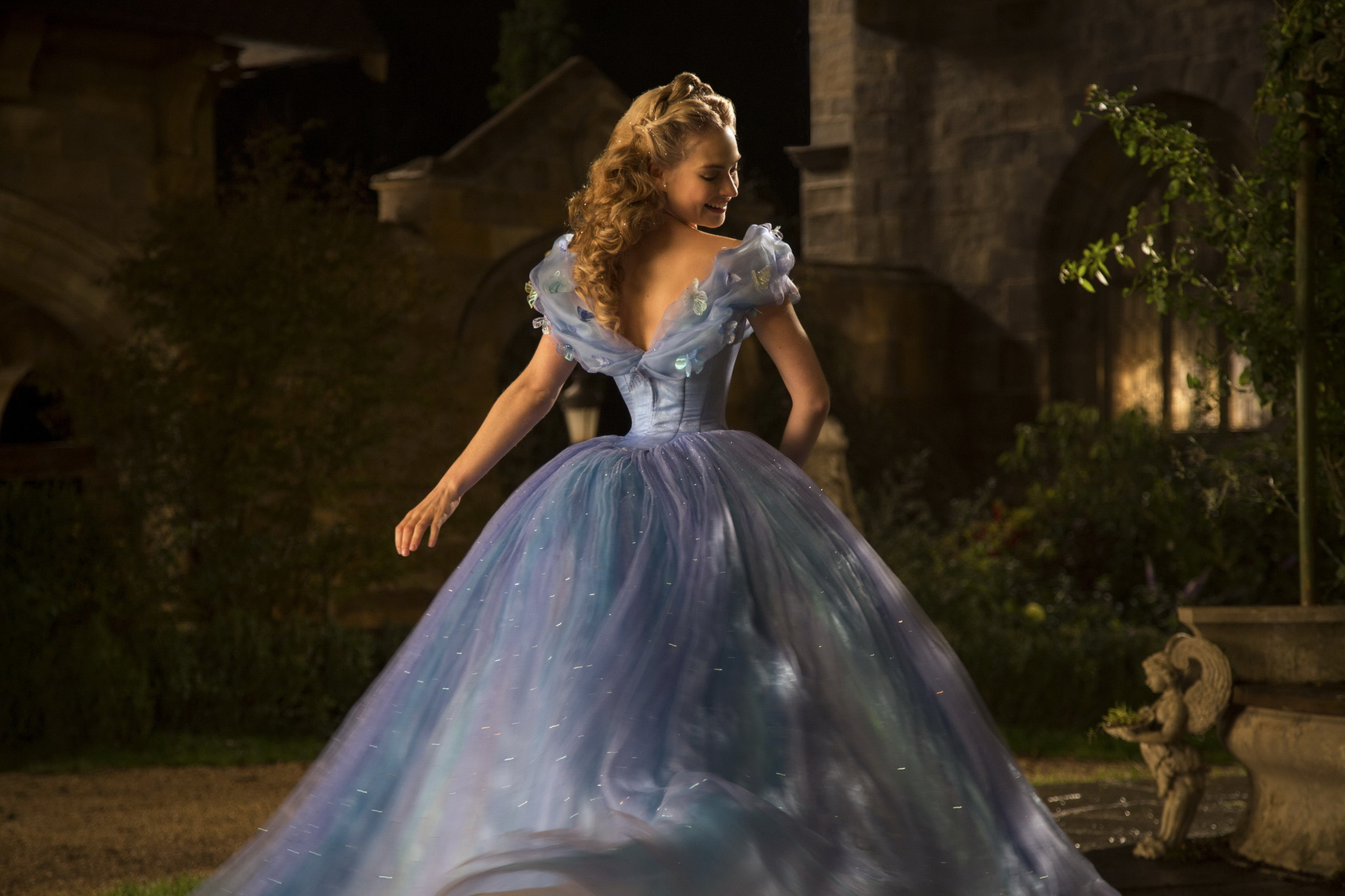
Josh: I do think you’ve wrung as much meaning from Cinderella as possible, considering that it’s a princess film where the princess herself is all but a supporting character. I haven’t seen the film as many times as you have, but upon revisiting it as an adult after many years away, I was shocked that the film wasn’t called Jaq and Gus-Gus or Two Mice, A Girl, and an Oversized Pumpkin. At least with Zootopia, the desire to make connections to the real world is more natural—that film’s commentary on racial stereotyping isn’t exactly subtext. Cinderella, on the other hand, doesn’t have nearly as many subtextual or extratextual elements. Arguably, the most interesting of all is that Cinderella was seen as a hopeful return to form for Disney, after a handful of package films that were made on the cheap and didn’t make a ton of money back.
But I’m not one to judge; I’m glad my son is a Zootopia fan, because even after 50 or 100 or a jillion viewings, it’s a good movie that holds up very well to detailed scrutiny. I would be lying if I said I hadn’t noticed some continuity issues, specific to the lead character’s 48-hour deadline to solve an extensive missing-mammal case, but those are easy enough to ignore. Better than prepping my own version of a viral video called “Everything Wrong with Zootopia”. And there are certain shots I’ve grown to appreciate more and more—a wide-shot of a train sliding into a station, or the mise-en-scene when two cops talk to each other, and oh my God, I just talked about the mise-en-scene in Zootopia.
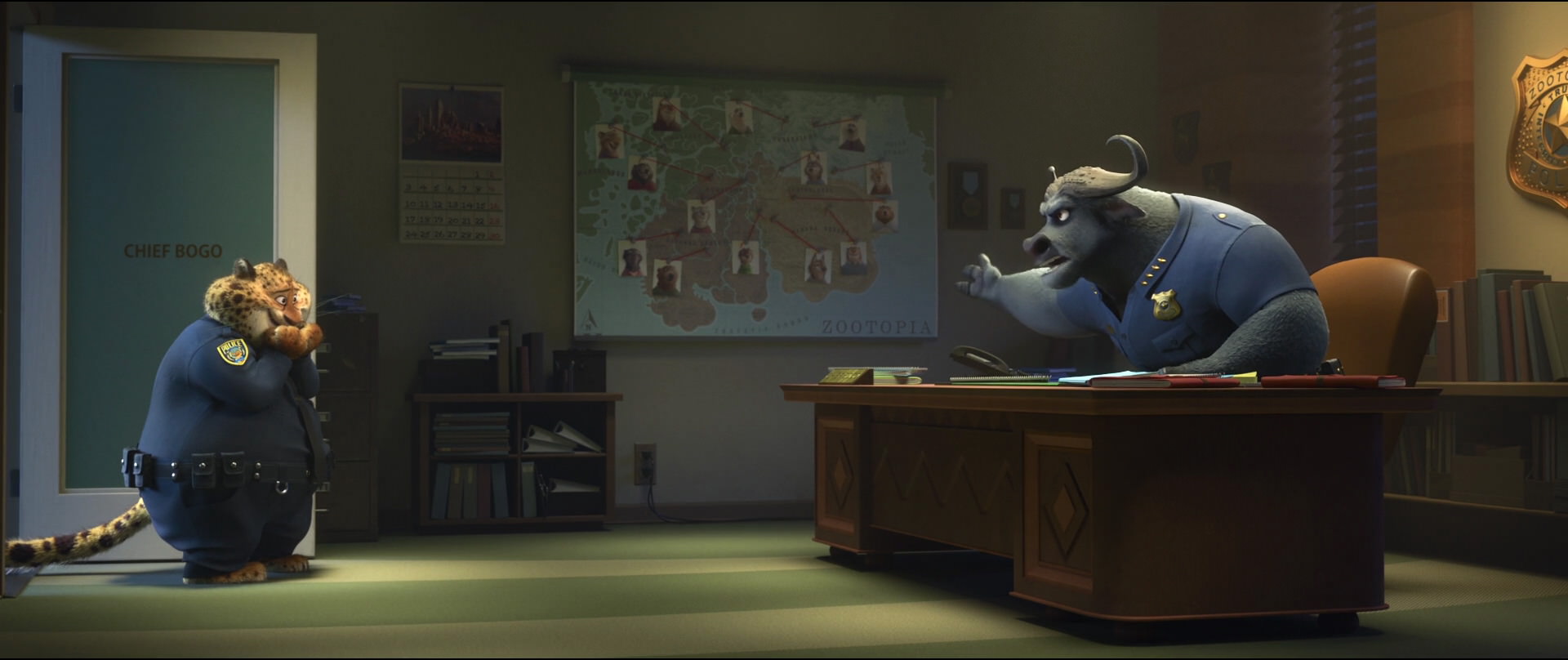
The flip side is that my son’s as obsessed, if not more so, with a Disney Junior show called “The Lion Guard,” and God, what a stinker it is. This spinoff of The Lion King about Simba’s Mohawk-sporting son Kion and a few of his friends who work as “protectors” of the Circle of Life is still in the middle of its first season, which means one thing: I have seen every episode of this show far too many times. I’ve seen it enough times to know that the overarching premise—the entire concept of the Circle of Life as the show views it—makes no damn sense. Hell, I’ve seen it enough times to be bothered by all the catchphrases (each of the five leads has at least two catchphrases).
So, while I would feel comfortable saying you’ve gone too far in relationship to Cinderella, I do get your willingness to engage critically with the film. It’s easy to put a Disney movie on as background music for yourself even if it’s the main attraction for your daughter; few of these films are objectionable enough that you have to keep a weather eye on the screen to make sure you’re not putting your child through something you’ll regret later on. The more often we watch something, the harder it is to simply ignore it; a movie like Cinderella or Zootopia can only be white noise for so long before we let ourselves pay closer attention to it, even if closer attention isn’t entirely warranted. (That’s a dig at “The Lion Guard,” which is absolutely not worth closer attention.)
But what does this repetition mean for our children? (Oy, I sound like Helen Lovejoy.) When I grew up, I was able to watch certain channels at certain times of the day. I have memories of watching the Disney Channel, but even as a kid, I didn’t get to watch TV all the time. (Granted, my parents might have been more lenient when I was 2.) I feel a bit guilty about it—the amount of time that we let Oliver watch TV is likely far higher than most child psychologists would recommend—but I also take comfort in the fact that most shows and movies he likes to watch repeatedly are attempting to teach decent lessons. It’s cold comfort when I’m stuck watching “The Lion Guard” for the 50th time, but…well, listen, I’m trying to stay positive. I’ll take a bland message about teamwork if I have to.
The other encouraging thing I take from the repetition is that my son’s learning new words from these shows and movies. He loves animals—what kid doesn’t?—but he’s better able to identify specific animals from watching Zootopia, or repeat certain words they say. Again, because he’s watching mostly preschool-friendly material (Zootopia has some scary moments, but the dialogue is G-friendly), I’m trying to take the positive look here. Does the same repetitive language crop up for you and your daughter, Tom? Does she like to repeat any of Cinderella’s (or, heaven forbid, Lady Tremaine’s) dialogue?
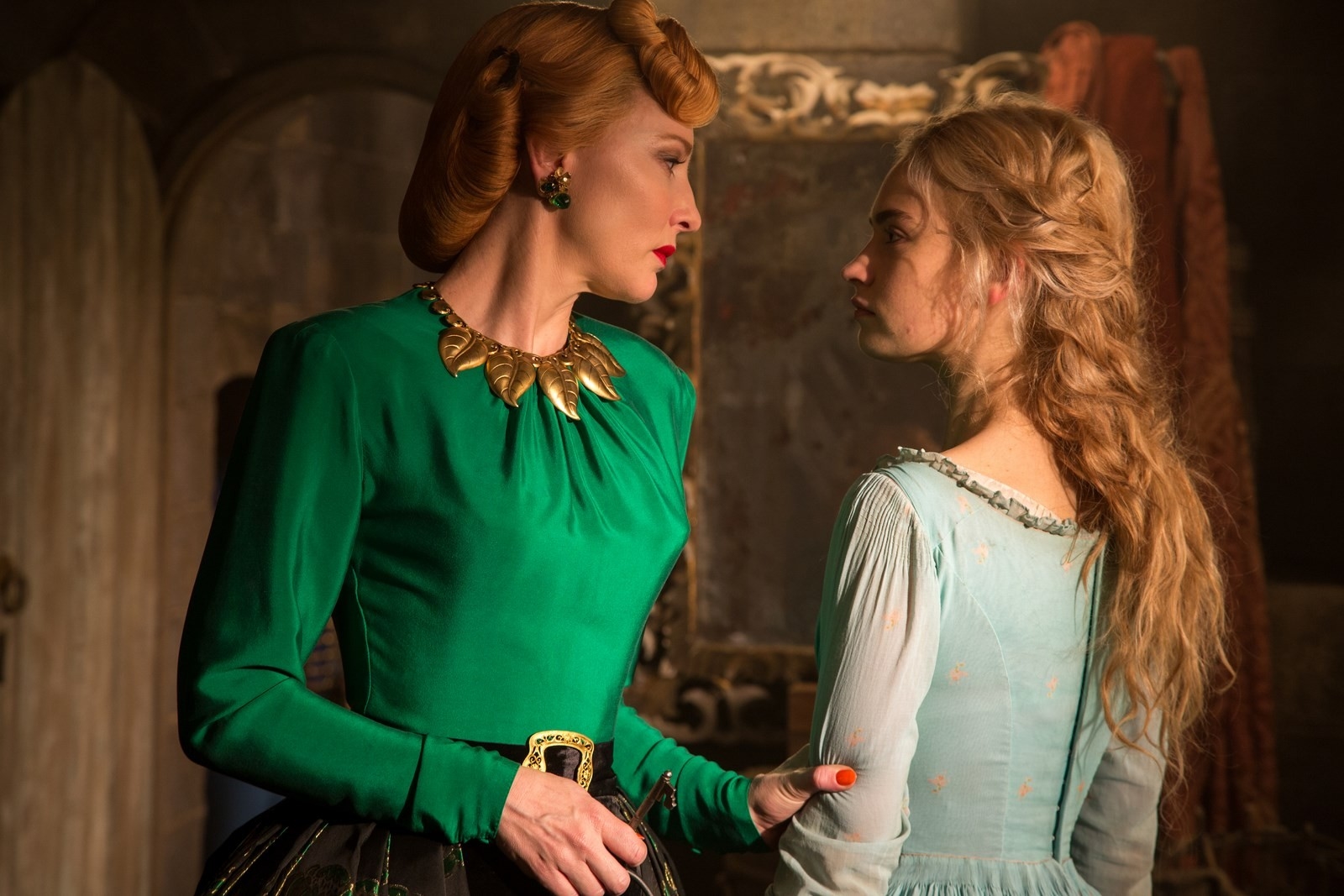
Tom: Funny you should say that I have “willingness” to engage with the film, as “will” is something I feel I’ve lost. I think part of why it’s so easy to slip into close (and frankly facetious) readings of these movies is because we’ve been conditioned to do just that by a culture that values repetition of the familiar over the new. As I said, this makes me question just how reliant critical argument in general should be on pulling at every last thread we can grasp, and it’s certainly not helped when the window of what art is worth discussing has shrunk so small. What does The Culture most value now? Marvel movies and tentpoles, a couple of prestige fall dramas ( only in relation to Oscar races), and a couple of “classics” that a) are only about 30 years old, tops, and b) better remembered as artifacts of nostalgia than for actual craft. (I am not the only one this summer to mention that the original Ghostbusters is not exactly holy writ.)
In other words: both of us wonder what this repetition means for kids, when what passes for adult culture is hardly more diverse and idiosyncratic. So does the tendency to over-read every major release, especially when it comes to parsing political and social implications, come from the same place that causes me to over-use my critical faculties when watching Cinderella: boredom? Boredom from the films, from the discourse, from the sheer volume of chatter. “Let’s talk about Suicide Squad’s politics,” as if there’s something there that might really be valuable in two months. “Let me try to read a meta-history of Disney animation” into a film that, as you say, isn’t all that layered.
It’s not all bad: watching so much Disney animation has allowed me to better appreciate the formal qualities of these films that I never really had before: how traditional hand-drawn cel animation of the 1940s differs from the xerographic era, or from the partially computerized era of Beauty and the Beast, and how different all of this is from the completely digital era of Tangled and Frozen. I like the kind-of-messy line work of 101 Dalmations, for example, or how the xerographic characters of The Many Adventures of Winnie the Pooh help make its “happening in a storybook” aesthetic work better than if it was done with the crisp, computer-assisted colors of the Disney Renaissance. These are the kind of formal details I maybe “knew” in an intellectual sense, but being forced to watch over and over has helped solidify my understanding of them, just as watching a bunch of studio films from before and after the advent of widescreen formats will eventually yield a better understanding of changing methods and consequences of composition.
My daughter doesn’t know any of this yet, of course. As far as she’s concerned, Cinderella is as new a movie as Tangled. All of these films are, to her, as much learning about the world and the things in it as they are about the stories themselves. And the imaginative play she draws on from these films is an unalloyed good, as far as I’m concerned. (Gus Gus is an imaginary friend she carries with her everywhere; he even needs to be buckled into her car seat with her.) Someday soon, I’m sure she’ll realize that the princesses from the “old” movies are more passive than those from the “new” movies, but I hope she can learn to treat these observations as part of a larger picture of how art works and not as a special “discovery” to be made by the most diligent critic. And maybe someday, our kids, by watching these films with such a different eye and with such different agendas than us adults, can show us how to engage with even a repetitive culture in a way that isn’t all meta discussions about nostalgia and memory.

Josh: Meta discussions about nostalgia in animation? I…wouldn’t know anything about that, certainly not in book form. Seriously, as much as I may scoff at your initial reading of Cinderella, I’m glad to see that you’re gaining a deeper appreciation of Disney animation as a whole through these viewing sessions. Even the weaker Disney films boast fascinating elements, no matter if they congeal into a successful whole. (That said, if my son starts repeat-watching The Aristocats, I may go mad.) One thing I want to note, off what you said above: for whatever reason, my drive to watch newer movies has weirdly diminished as I watch Zootopia for the 80th time; its skill and crisp screenplay is worth appreciating even now, and very little about this summer’s big movies compelled me in the way that this faux-48 Hrs. does. I’m still trying to allot time for myself to catch up with movies like The Witch and The Nice Guys, but being stuck with Zootopia isn’t the worst possible fate.
In general, I’m trying to convince myself—with many of the same reasons you mention—that this repetitive viewing in which my son indulges is a good thing in the long run. I haven’t had nostalgia in mind as I watch “The Lion Guard” or Zootopia or his other favorites, primarily because they’re not based in my own childhood loves. But I can only imagine how embedded the characters and dialogue of shows and films like these will be in my son’s brain as he grows up. Regarding nostalgia and the examples you mention, it will be doubly interesting (and possibly terrifying) to introduce my son to, say, the Indiana Jones films when a fifth one comes out a month before he turns 5; or to Ghostbusters (which may not be holy writ, but is still funny) and its remake; or, frankly, any number of Disney animated films that are now getting live-action reboots (or, in the case of Jon Favreau’s The Lion King, a computer-animated reboot) to please the adults who grew up with these films as much as it is to please those adults’ kids. The nostalgia of my youth may just become the microwave-reheated nostalgia of my son’s youth, instead of something new burrowing in his brain for years to come. So maybe I should be glad he’s glommed onto Zootopia. It’s not the most original film Disney’s ever made, but at least it’s original. Even on the 100th viewing.

















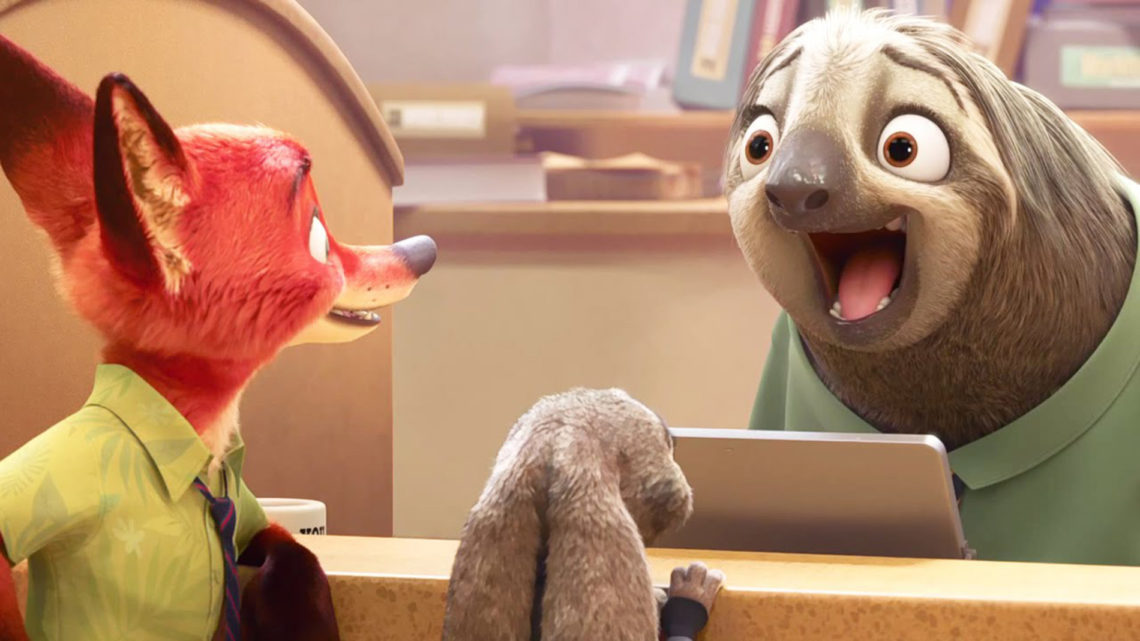
2 thoughts on “What It’s Like to Watch the Same Movie 100 Times”
Thanks guys, this post was therapeutic to read.
I’m a cinephile, full-time motion graphics designer, & father of two girls. Our older daughter is currently begging to watch “Tangled” every day. Sometimes more than once. We also have a fairly lengthy bedtime story of “Rapunzel” that I also read. Every. Single. Night.
“Tangled” is actually one of the movies I’ve enjoyed rematching the most. The music isn’t as strong as “The Little Mermaid” or “Beauty and the Beast,” but the visuals and story beats really work well for me. It was “Brave” before this (also better upon re-watching). “Star Wars” before that. “Zootopia,” briefly. I tried for “Babe” – one of my favorites. it didn’t stick.
“Frozen” seems to be the only one she returns to – possibly because she just became a big sister a year ago.
The most interesting thing about this, for me, is how she’s reacted to villains. She loves to stare at pictures of Ursula, Darth Vader, the “Sand People/Tusken Raiders,” Mother Gothel, the stepmother in “Cinderella.” She’ll ask “how did they get bad?” Or “is he/she bad yet?” Sometimes it’s “I think (Mother Gothel) is good now, right?” She spends more time pretending to be the princess-du-jour, so I suppose I find it refreshing to see her developing a moral compass.
Am I doing her harm by letting her watch these over and over? Hard to say – I feel like I would have asked to do the same if we had streaming access or DVD/BluRays as a child. Re-watching films as a teen led me to apply to film school, sparked an interest in design and animation, which is what I’m doing…right after I press “Post.”
Oh man, “The Lion Guard” is so terrible! The entire way the group defends the Pride Lands makes no sense! My youngest daughter is 3, so I’ve done a lot of studying. My oldest is 7, so both of them veer around from younger kids’ shows and older ones. Few are worse than the Lion Guard. Maybe Goldie & Bear, but that’s for another discussion.
The film that my younger daughter loves is Sleeping Beauty. I’m a Disney animation fan but had always dismissed it as “lesser Disney”. Watching it repeatedly, I’ve come to appreciate just how beautiful it is. The animation is like no other Disney film, even from that era! The cultural context isn’t great – Aurora basically has no agency of her own and relies on others to save her. But I’ve looked at it a lot closer than I would have in just a single viewing or two. So there is a benefit, though overkill of the songs (especially one where they say “hail to the king, hail to the queen” over and over) can be too much.